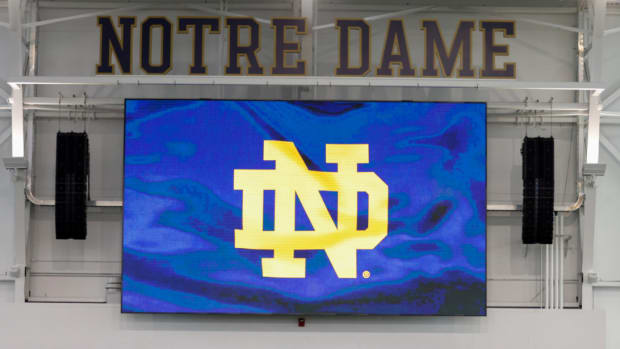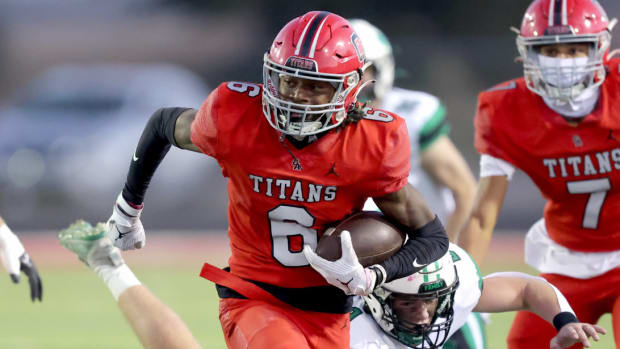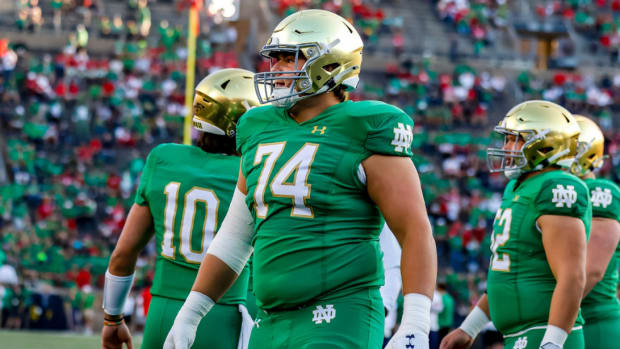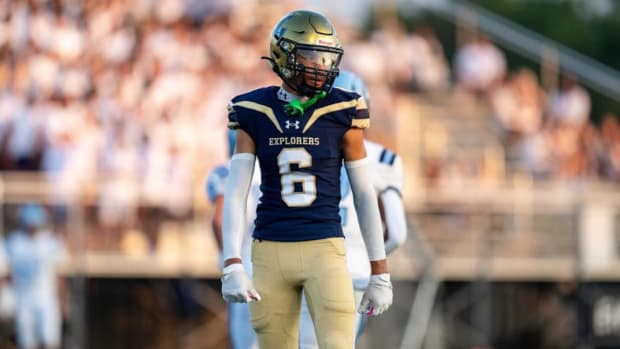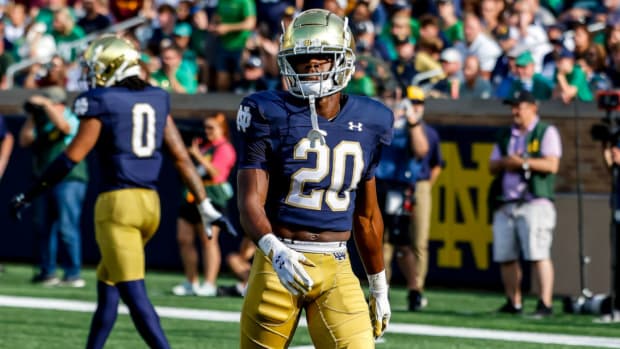Notre Dame Needs To "Want" To Run The Ball Better
Notre Dame head coach Brian Kelly has made a number of, let’s say, interesting comments about his team’s run game over the last month.
It began after the team’s victory over Stanford when Kelly was asked about his team's offensive identity.
“I think it is what it is. We have the ability to run the football when needed,” Kelly said after his team rushed for 190 yards against the Cardinal. “As you saw today, we rushed for close to 200 yards when we needed to, and the ability to make big plays.”
He later said the offense had “a capable running game when needed ... to be called upon.”
During a December 8 interview, Kelly built on that analysis.
“We ran the ball when we wanted to run the ball this year; that’s a big deal,” Kelly stated. “When we needed to run clocks out, when we needed to run the football, we ran it when we wanted to. That’s the mark of a good running game.”
That's not actually the mark of a good run game, but I've already broken that down recently.
Kelly went on to note the desire for his team to be more consistent running the football and to create more big plays, both admirable and needed objectives, but he seemed like a coach that was otherwise content with his team’s ground game. He justified his team’s mediocre numbers and ranking by pointing to the loss of Tommy Kraemer and Robert Hainsey, who were injured in games seven and eight.
The problem with that theory is Notre Dame averaged 208.8 yards per game and 5.4 yards per carry in the four games without both Kraemer and Hainsey, and 160.5 yards and 4.6 yards per carry in the eight games prior to their injuries. It helped Notre Dame faced the 59th, 88th and 89th ranked run defenses in the final four games with the standout blockers.
Yesterday’s press conference was the first time Kelly seemed remotely dissatisfied with the performance of his ground game, but even then it seemed to be a minor concern.
“We ran the ball at times effectively and at other times we weren’t effective,” Kelly said. “We want to be, moving forward, much more effective, so that requires complete collaboration and everybody on the same page, and that’s what I’m looking to accomplish here over these next few days.”
Kelly said we’ll see changes in the game against Iowa State and its 34th ranked rush defense, although they will be minor.
“I think you’ll clearly see some of the things we want to accomplish in terms of the consistency in the run game, and passing game too,” Kelly continued. “This is an offense that was pretty darn good, too, so we’re not talking about reinventing the wheel here. … For the untrained eye you’re not going to see a whole lot of difference, but for those who really study our offense I think you’ll see some improvements that help us from the start of the game to the end of the game.”
Kelly’s admission of the need to be more consistent doesn’t alleviate the concerns that rightfully exist about the offense and its inability, or unwillingness, to run the ball at the level needed to be a truly elite offense. The fact is Notre Dame’s offense beat up on inferior opponents the last two seasons. Notre Dame struggled against the better defenses on the schedule, and the performance of the offensive line/run game has been a driving force.
Based on data, it seems that Notre Dame only “wants” to run the ball against opponents that struggle to stop the run. Outside of Virginia (157 yards), Notre Dame struggled mightily to run the ball against Top 50 defenses. In the the other four games against defenses that ranked in the Top 50 in rush defense this season, Notre Dame averaged just 76.0 yards per game and 2.7 yards per carry.
Notre Dame averaged just 49.5 rushing yards (sacks removed) and 2.3 yards per carry in its two losses this season. It rushed for just 114 yards (sacks removed) and 3.9 yards per carry during its College Football Playoff loss to Clemson last season.
Simply put, Notre Dame cannot run the ball when it wants to, and it’s not about consistency. It’s about not making the run game a priority and it’s about an offensive line that struggles against quality defenses. Against the best run defenses the Irish run game has been all but non-existent in recent seasons.
When you compare Notre Dame's offense against top offenses like Clemson, Alabama, Ohio State and Oklahoma the numbers tell a very obvious story, Notre Dame’s identity of “running when they want to” just isn’t getting it done.
This is not a call for Notre Dame to go back to its 1988-93 roots, something Kelly commented on recently. This isn't about Notre Dame and its past at all, this is about evaluating the teams that compete for and win titles in the modern era and what they do offensively.
Until the identity changes and until the offensive line plays much, much better than it has the last two seasons, Notre Dame will continue to underwhelm on offense against the better opponents, which is something that keeps Notre Dame from taking the next step as a program.
Follow me on Twitter: @CoachD178
Visit our Facebook page at: https://www.facebook.com/IrishMaven/
